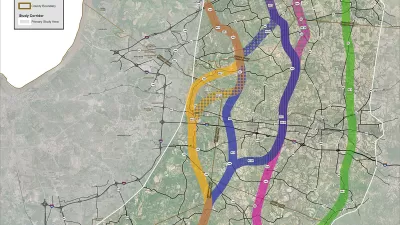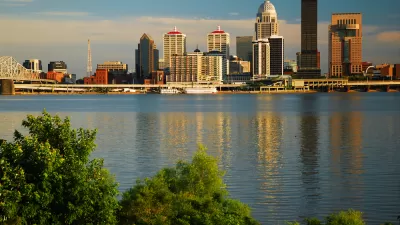Louisville's goals to plant and grow an urban forest to mitigate the city's heat island effect has run afoul of the Kentucky Transportation Cabinet's engineering standards for state owned roads.
"The city's tree advocates and the Kentucky Transportation Cabinet are colliding head-on over rules for safer and easier-to-maintain state roadways," reports James Bruggers.
"As Metro Louisville, neighborhood and nonprofit organizations plant thousands of trees to fight a documented problem of urban heat, the cabinet's highway department is working to prevent new shade trees along streets it maintains, such as Brownsboro Road."
The state highway department's regional office has argued that trees present a safety hazard to "motorists who may drive off the road." The cost of maintenance is also cited in opposition to the street trees. The city, however, has identified street trees as a solution for its heat island problem. A 2013 study found that Louisville has the worst heat island effect of any city in the country.
FULL STORY: Ky. highway department blocks shade trees

Planetizen Federal Action Tracker
A weekly monitor of how Trump’s orders and actions are impacting planners and planning in America.

Maui's Vacation Rental Debate Turns Ugly
Verbal attacks, misinformation campaigns and fistfights plague a high-stakes debate to convert thousands of vacation rentals into long-term housing.

Restaurant Patios Were a Pandemic Win — Why Were They so Hard to Keep?
Social distancing requirements and changes in travel patterns prompted cities to pilot new uses for street and sidewalk space. Then it got complicated.

In California Battle of Housing vs. Environment, Housing Just Won
A new state law significantly limits the power of CEQA, an environmental review law that served as a powerful tool for blocking new development.

Boulder Eliminates Parking Minimums Citywide
Officials estimate the cost of building a single underground parking space at up to $100,000.

Orange County, Florida Adopts Largest US “Sprawl Repair” Code
The ‘Orange Code’ seeks to rectify decades of sprawl-inducing, car-oriented development.
Urban Design for Planners 1: Software Tools
This six-course series explores essential urban design concepts using open source software and equips planners with the tools they need to participate fully in the urban design process.
Planning for Universal Design
Learn the tools for implementing Universal Design in planning regulations.
Heyer Gruel & Associates PA
JM Goldson LLC
Custer County Colorado
City of Camden Redevelopment Agency
City of Astoria
Transportation Research & Education Center (TREC) at Portland State University
Jefferson Parish Government
Camden Redevelopment Agency
City of Claremont





























